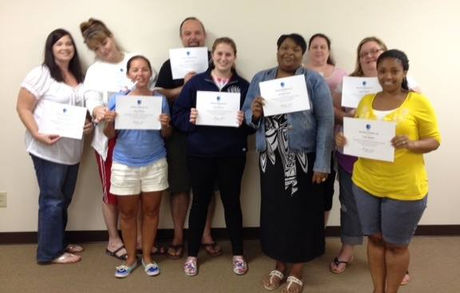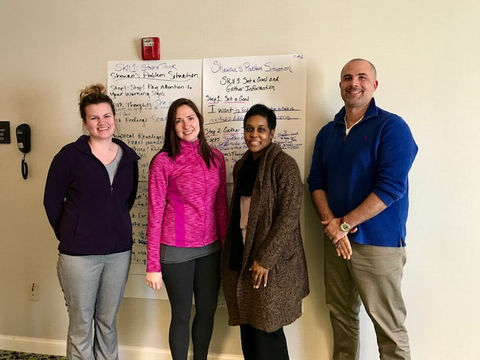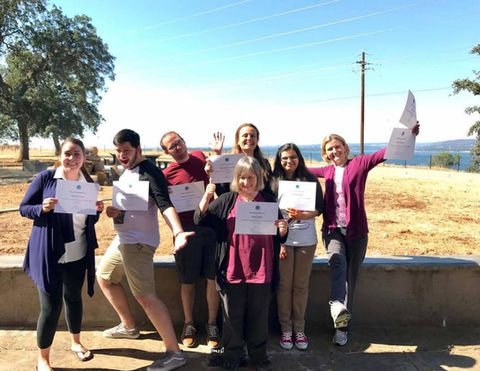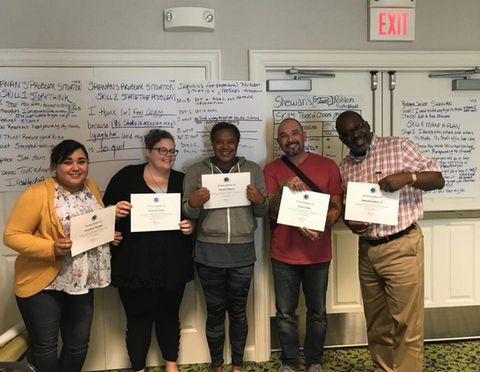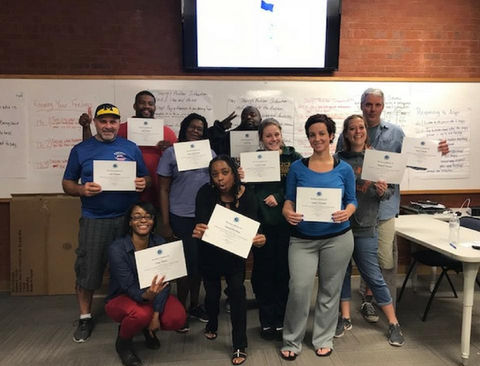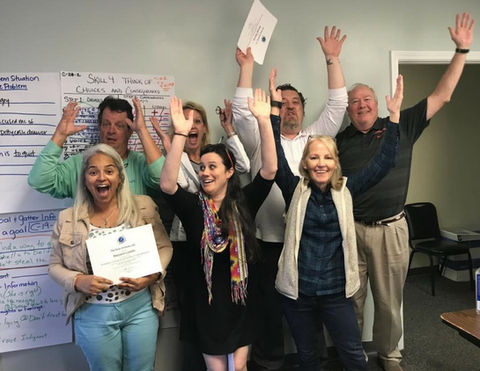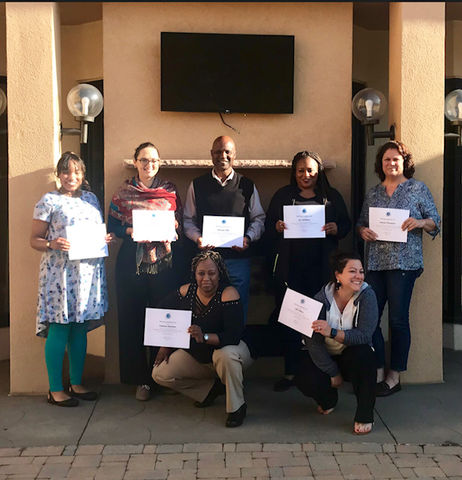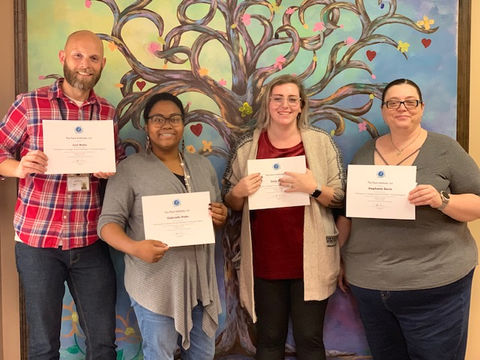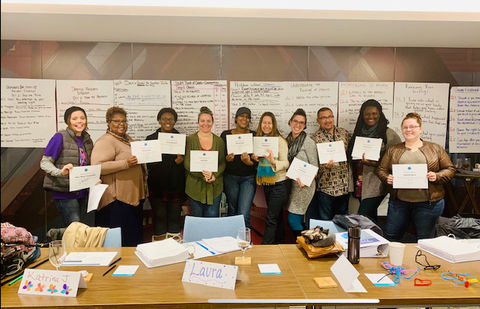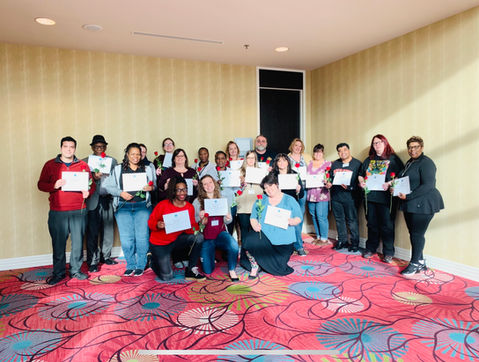Training Details
Training Venue: The training center, located in the Atlanta area, is more than a venue - it's an urban oasis where professionals come to grow, transform, and connect. The Pace Center of Morrow is located at 5894 Jonesboro Road, Morrow, Georgia 30260 (10 miles from the Atlanta Hartsfield-Jackson International airport) - inside of the Morrow Plaza.
Cost: Individual registration is $1,500. Meals and travel are the responsibility of each registrant.
Training Schedule: The training schedule is below. If traveling by air, you are recommended not to book a flight out of Atlanta that departs before 6:30 pm on the last day of class. Attendance and participation in the entire training is required to receive a certificate of completion.
-
Day 1 - Monday, 8:00 am - 3:30 pm
-
Day 2, Tuesday, 8:00 am - 3:30 pm
-
Day 3, Wednesday, 8:00 am - 3:30 pm
-
Day 4, Thursday, 8:00 am - 3:30 pm
-
Day 5, Friday, 8:00 am - 3:30 pm
Travel: The Pace Institute, LLC is not responsible for participants' travel cost (i.e., airfare, meals, hotel, ground transportation). If traveling by air, participants will fly into the Atlanta Hartsfield-Jackson International Airport ("ATL") which is 10 miles from the training venue. Also The Pace Institute, LLC has a negotiated corporate rate (corporate code: 334892) with Drury Inn and Suites Atlanta Morrow which is 1 mile from the venue at 6520 S Lee Street, Morrow, GA 30260. Their number is (770) 960-0500. Click to make hotel reservation.
Registration Deadline: Enrollment space is limited. To confirm your attendance, your paid registration must be received before the training. Registration will close once capacity is reached.
Instructional Methods: This is an in-person training that will include instructor demonstrations of lessons from the program manual, participant role-plays, group discussions, small group exercises, and participant teach backs/try-outs. Participants will also need to factor in an hour of homework time for the first four days of training.
Program Material: Enrollment includes a printed copy of the latest version of the Thinking for a Change facilitator's manual (version 4.0) as well as an electronic copy of the accompanying program slides and video vignettes.
Training Prerequisites: There is no special level of education or professional qualifications required to be trained in the Thinking for a Change program. However, an individual who plans to facilitate the Thinking for a Change program should possess the following characteristics: 1) Believe people, including criminal offenders, can change; 2) Does not easily become frustrated by client participants; 3) Is firm, but fair and nonjudgmental; 4) Is consistent when interacting with client participants; 5) Can communicate in an effective manner (e.g. calm, even voice tone); and 6) Has an understanding of cognitive behavioral interventions.
For more information, email info@thepaceinstitute.com or 404-369-0671.
Payment, Cancellation and Refund Policy
Payments. The cost of this training course is $1,500.00. Enrollment is not complete or reserved without payment.
Early Cancellations. You may cancel an individual registration and receive a full refund, less a $75 processing charge, provided you cancel at least 14 calendar days in advance of the start date of the training. To cancel your enrollment, you must contact: info@thepaceinstitute.com. Refunds will be issued to the payor of record.
Late cancellations. If you cancel fewer than 14 calendar days before the class, you must, within 12 months, register for and attend another class; otherwise all payments are forfeited to The Pace Institute.
No shows. There is a non-refundable no show-fee. In the case of a no-show, the course fee will not be refunded.
Incomplete course completions. There is a non-refundable fee for incomplete course completions. In the case that you begin this course and do not complete it, the course fee will not be refunded.
The Pace Institute reserves the right to cancel any scheduled class at our discretion. If The Pace Institute cancels, any payment received will be refunded in full.
Photos, Videos, Audio Recordings. All attendees are advised that The Pace Institute, LLC and others hired by The Pace Institute, LLC, may photograph, video, and record portions of the training for promotional purposes. In doing so, The Pace Institute, LLC strives to have an honorable approach to obtaining and using the content for promotional purposes. The photography, videography, and recording content is the property of The Pace Institute, LLC and may be used for promotional purposes (e.g., electronic and printed publications, websites, educational use, event ads, etc.) without further permission of the subjects/attendees. As a general practice, there is no attempt to collect individual release forms unless there is a reasonable expectation of privacy. In cases where there is a reasonable expectation of privacy, The Pace Institute, LLC will make a reasonable effort to contact every person in the photo and to obtain a signed release form allowing The Pace Institute, LLC to use the photo, video and/or recording for promotional purposes.
License to use copyrighted material. Thinking for a Change 4.0 is copyrighted by its authors Jack Bush, PhD, Barry Glick, PhD, and Juliana Taymans, PhD. The authors have granted The Pace Institute, LLC and its’ President, Angela E. Dash, Ph.D., a non-exclusive license to use the copyrighted material for commercial gain. Parties wishing to gain authorization to sell or use Thinking for a Change 4.0 copyrighted materials for commercial gain, should also request the explicit permission of the authors. For more information, contact adash@thepaceinstitute.com.
Completion of Training Does Not Mean "Certified" or "Licensed". Although it is highly recommended, in support of program fidelity and integrity, that one completes at least a 32-hour training program before facilitating a Thinking for a Change group, there is no credentialing process in becoming a Thinking for a Change Facilitator. Therefore, completing a Thinking for a Change facilitator's training program does not make one a "Certified Thinking for a Change Facilitator" nor a "Licensed Thinking for a Change Facilitator." Those are credentials that do not exist at all - even with the National Institute of Corrections - the agency who produces the program. However, completing facilitators will be provided a certificate documenting their successful completion of a 32 hour Thinking for a Change Facilitators’ Training Program delivered by a trainer who has been trained by the National Institute of Corrections, to train other T4C facilitators. Successful completion requires attending and participating in the entire training.
This is training for facilitators and NOT for trainers. The Thinking for a Change Facilitator's training is NOT the same as the Thinking for a Change Train-the-Trainer class. While this Thinking for a Change Facilitator’s training prepares individuals to facilitate Thinking for a Change groups, it does not prepare individuals to train other facilitators. In order to protect the fidelity of this evidence-based program, it is strongly encouraged by The Pace Institute, as well as the program’s producer – the National Institute of Corrections, for individuals to only train other facilitators in the Thinking for a Change program, after achieving the following qualifications:
-
Completion of a Thinking for a Change Facilitator’s training of a minimum of 32 hours (this can be obtained by attending this training offered by The Pace Institute);
-
Facilitation of at least two full cycles of Thinking for a Change groups; and
-
Completion of a Thinking for a Change Train the Trainer training program.
The Pace Institute only offers the Thinking for a Change Facilitator’s training program. It does not offer the advanced training – “Thinking for a Change Train the Trainer” training program. For more information on advanced training opportunities for qualified Thinking for a Change facilitators who have completed the minimum Thinking for a Change Facilitator’s training and facilitated at least two full cycles of Thinking for a Change groups, contact the National Institute of Corrections.

Changes to T4C Training Availability
For over a decade, Dr. Dash and The Pace Institute, LLC have had the privilege of delivering the Thinking for a Change (T4C) Facilitator’s Training, equipping facilitators to guide lasting behavioral change. Having trained over 80 classes and worked with organizations across the country, we’ve built a strong reputation for providing in-depth and impactful training.
In 2025, we will fulfill our final T4C facilitator training obligations with individuals and organizations we have already contracted with. However, we will no longer be scheduling open enrollment trainings. Moving forward, coaching and supervision consultative services will be available for those who have been trained by Dr. Dash and The Pace Institute, LLC, providing ongoing support to facilitate the program with integrity and effectiveness.
Thank you for entrusting The Pace Institute and Dr. Dash with your T4C training needs over the years.
Visit our Home Page to explore a full list of our other services.

Program Background
Thinking for a Change (T4C) is an integrated cognitive behavioral change program authored by Jack Bush, Ph.D., Barry Glick, Ph.D., and Juliana Taymans, Ph.D., under a cooperative agreement with the National Institute of Corrections (NIC). T4C incorporates research from cognitive restructuring theory, social skills development, and the learning and use of problem-solving skills.
T4C is comprised of 25 lessons that build upon each other and contain appendices that can be used to craft an aftercare program to meet the ongoing cognitive behavioral needs of offender groups. Not all lessons can be completed in one session, so a typical delivery cycle may take 30 sessions. Sessions should last between one and two hours. Ideally, the curriculum is delivered two times per week, with a minimum recommended dosage of once per week and a maximum of three times per week. Participants must be granted time to complete mandatory homework between each lesson.
The program is designed to be provided to offender populations - adults and youth, males and females. It is intended for groups of eight to twelve and should be delivered only by trained facilitators. Due to its integrated structure, T4C is a closed group, meaning members need to start at the beginning of a cycle, and may not join the group mid-stream (lesson five is a logical cut-off point for new group members).
Don't take our word for it
I cannot speak highly enough of the exceptional service I received from Quick's Accounting Firm. From the moment I engaged in their services, I was impressed by their professionalism, attention to detail, and personalized approach. The team took the time to thoroughly understand my business needs and provided invaluable guidance that went above and beyond my expectations.

Smith & Co.
Plant & Coffee Company

Take Theirs...
"Quick's Accounting Firm has been an invaluable asset to my business. Their expertise, professionalism, and dedication to client satisfaction are truly commendable. I appreciate how they take the time to understand my unique financial situation and provide tailored solutions that align with my goals. With Jones & Associates, I feel confident knowing that my finances are in capable hands."

Emma Thompson
Thompson Marketing Solutions

Our Reviews
"I've had the pleasure of working with Quick's Accounting Services for several years now, and I can confidently say that they are the best in the business. Their team, led by Sarah Davis, goes above and beyond to ensure that my financial needs are met with precision and care. From tax planning to strategic advice, they have consistently delivered exceptional results. With Quick's Accounting Services, I have found a trusted partner that I can rely on for all my accounting needs"

James Smith
Smith Enterprises

Thinking for a Change Facilitator's Training Program Graduates
Don't take our word for it
I cannot speak highly enough of the exceptional service I received from Quick's Accounting Firm. From the moment I engaged in their services, I was impressed by their professionalism, attention to detail, and personalized approach. The team took the time to thoroughly understand my business needs and provided invaluable guidance that went above and beyond my expectations.

Smith & Co.
Plant & Coffee Company

Take Theirs...
"Quick's Accounting Firm has been an invaluable asset to my business. Their expertise, professionalism, and dedication to client satisfaction are truly commendable. I appreciate how they take the time to understand my unique financial situation and provide tailored solutions that align with my goals. With Jones & Associates, I feel confident knowing that my finances are in capable hands."

Emma Thompson
Thompson Marketing Solutions

Our Reviews
"I've had the pleasure of working with Quick's Accounting Services for several years now, and I can confidently say that they are the best in the business. Their team, led by Sarah Davis, goes above and beyond to ensure that my financial needs are met with precision and care. From tax planning to strategic advice, they have consistently delivered exceptional results. With Quick's Accounting Services, I have found a trusted partner that I can rely on for all my accounting needs"

James Smith
Smith Enterprises




